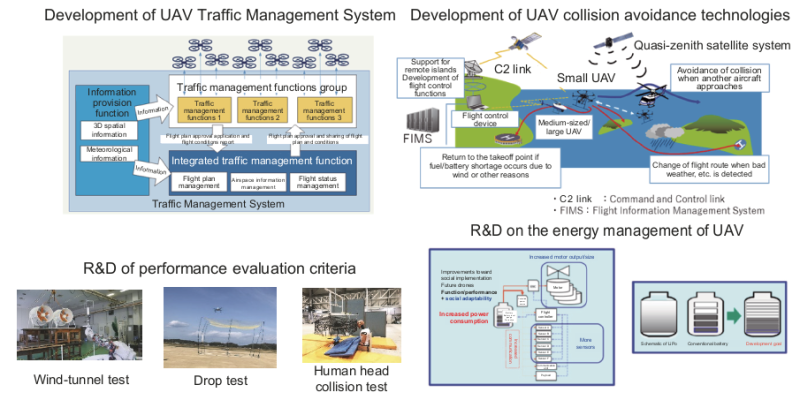Drones and Robots for Ecologically Sustainable Societies Project
Project overview
PL: OSUMI Hisashi (Professor, Chuo University)
HARADA Kenya (Senior Researcher, Japan Aerospace Exploration Agency [JAXA])
HAYASHI Eiyu (Nikkan Kogyo Shimbun, Ltd.)
OKADA Hiroyuki (Professor, Tamagawa University)
TADOKORO Satoshi (Professor, Tohoku University)
YOKOKOHJI Yasuyoshi (Professor, Kobe University)
EGUCHI Amy (Assistant Professor, University of California, San Diego)
It is hoped that the use of drones and robots will help conserve energy, particularly in the logistics sector where there is demand for energy-efficiency due to increased deliveries of small parcels and lighter load ratios, as well as in the infrastructure inspection sector where there is an urgent need to reduce the use of resources by ensuring longer live-spans at infrastructure facilities through effective and efficient inspections.
This project aims to encourage the development of drones and robots that can be used in sectors such as logistics, infrastructure inspections, and disaster response, while also establishing systems and conducting test flights in preparation for their increased utilization.
Domestic and overseas trends of the systems, technologies, standardization, and other aspects of flying cars will be also surveyed.
Description of Research and Development
[1] Development of performance evaluation methods for robots and drone devices
- (1) R&D of performance evaluation methods
Establish performance evaluation methods for each sector and robot type, for various types of robots. - (2) R&D to improve energy-saving performance
Develop technology for energy-efficient systems required for increasing the continuous operating time of various types of robots. - (3) R&D on the energy management of UAV
Research and develop peripheral systems such as the energy management system required for increasing the continuous safe operating time of various types of robots.
[2] Development of UAV Traffic Management System and collision avoidance technologies
- (1) Development of UAV Traffic Management System
Develop various functions and systems to ensure that UAVs can be operated safely, based on the Traffic Management System developed under the project which include functionalities for information provision, traffic management and integrated traffic management. - (2) Development of UAV collision avoidance technologies
Develop technologies that enable UAVs to detect objects either on land or in midair, so that they can avoid collisions when flying in real time.
[3] Promotion of international standards related to robots and drones
- (1) De jure standards
While cooperating on the international level, conduct studies to identify trends among international organizations and other groups around the world promoting standardization, and carry out activities linking the results of this project to international standards. - (2) De facto standards
Technology is being developed at tremendous speeds and robots are the key to developing de facto standards, so Japan will gather information regarding the latest global technology trends and promote methods to accelerate technology development using rules formulated in Japan.
[4] Research on AAM
- (1) Benchmarking research on AAM flight tests in overseas
Research several overseas trends in AAM demonstrations, including the NASA AAM National Campaign (U.S.), Re.Invent Air Mobility (France), and UIC2 (Europe), and develop a plan of AAM flight tests with phasing scenarios suited for Japan. - (2) Research on operational structure and business models for AAM
Research on specific demonstration sites, operational structure, and business models for implementation of AAM. - (3) Research on elemental technologies for the implementation of AAM
Toward realization of AAM in the future, we formulate a framework for the maturity level of AAM in Japan, identify the elemental technologies required to achieve the levels of each, and discussion about technical requirements in line with the maturity levels of each. - (4) Research of overseas regulations and international standardization trends related to AAM
Research tregulations and standardizations related to AAM, organize work items that should be participated in from Japan, formulate a rule-making strategy, and hold events to stimulate discussion.
Reference:  Drones and Robots for Ecologically Sustainable Societies Project
Drones and Robots for Ecologically Sustainable Societies Project
-
 Project overview
Project overview
Basic information
| Technical field |
|
Project code | P17004 |
|---|---|---|---|
| Department in charge |
|
||
Last Updated : June 13, 2022
